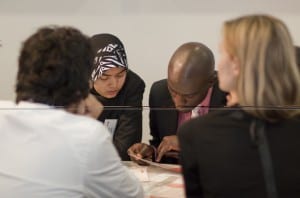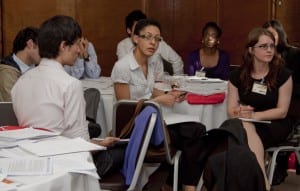Social enterprises are profit-driven businesses with social and environmental aims. Some of the best known social enterprises include household names like the Big Issue, Divine Chocolate and John Lewis. Have you ever had an idea for a business that could have a positive impact on your community or the wider world? Lindsey Shirah, Projects Coordinator at Queen Mary Careers & Enterprise Centre, had a chat with James Larbi, an Aerospace Engineering undergrad at Queen Mary University of London who started his own social enterprise, Pre-ued, during his second year. Below James shares how he developed his idea and the most important lessons he’s learned along the way.
What is your social enterprise and how does it work?
JL: Pre-ued is an educational technology venture that partners with schools to make their courses publicly available online. We help top institutions take their mission from the walls of the classroom to the world by giving them an online platform where they can exponentially reach more students, raise their international reputation and boost admissions. Students in turn from around the world can study the best high school, secondary and pre-university courses for free.
How did you come up with the idea?
JL: It was in the summer of 2013. I had finished my 1st year of university and had just come back from travelling abroad. With a lot of time on my hands I thought it would be great to start a social enterprise/start-up and considered doing something relating to learning and technology. I had been drawn for a while to the idea of open education for everyone. This was partly due to a gap year I spent in Ghana, West Africa, where I worked with top academics making their research publicly available online. Some really phenomenal strides had already been made publishing university courses. There was however no one at the time doing the same for secondary schools so I wanted to pursue that idea.
 I ran the idea past my business module course lecturer, Adam, for feedback and was delighted to hear his positive response and advice on developing it. Adam also taught me about the “Innovator’s Dilemma”, which is a state of mind that every entrepreneur or innovator can get stuck in that potentially blinds them to the flaws of their idea. Through talking to Adam I learned there are many phenomenal lecturers and staff members at university who will gladly help you develop your ideas. I also spoke with the phenomenal team at the Queen Mary Careers & Enterprise Centre who are really passionate and informative about social enterprises and start-ups in general. Rachel, James and Maya, part of the core enterprise team, have been so supportive of my idea and me as a whole.
I ran the idea past my business module course lecturer, Adam, for feedback and was delighted to hear his positive response and advice on developing it. Adam also taught me about the “Innovator’s Dilemma”, which is a state of mind that every entrepreneur or innovator can get stuck in that potentially blinds them to the flaws of their idea. Through talking to Adam I learned there are many phenomenal lecturers and staff members at university who will gladly help you develop your ideas. I also spoke with the phenomenal team at the Queen Mary Careers & Enterprise Centre who are really passionate and informative about social enterprises and start-ups in general. Rachel, James and Maya, part of the core enterprise team, have been so supportive of my idea and me as a whole.
How have you gone about setting up your social enterprise?
JL: I started out by developing a prototype of the platform. It was so basic I laugh at what I did when I think of it now! I realized that the only way to gain momentum in a start-up is to, in the words of Nike, ‘just do it.’ This ties along with some wise words from Reid Hoffman, the co-founder of LinkedIn, who said “If you are not embarrassed about your first product, you’ve probably launched too late”
After I had a basic prototype I needed to get some users. The users are primarily any student that would like to study a top course for free, but I had no courses to offer from schools at the time! This was a classic case of the “chicken and egg” story. I decided to start out by introducing the idea to schools and teachers. In order to get access to them I signed up to be an exhibitor in the Innovation Zone at the BETT Show 2014, the largest learning technology show in the world. Sharing the floor with some of the biggest names in technology was a great privilege. I got to meet some of the best teachers, schools and innovators in the world and was able to form some partnerships throughout the course of the show.
What have you found to be most challenging about this project?
JL: The most challenging thing about the project has been accessing the funds to really scale up the venture. This is however not insurmountable now, with the numerous types of support from organizations such as Unltd who are passionate about social change and empowering social entrepreneurs to make a difference in the world. The explosion of crowd-funding also gives entrepreneurs the opportunity to raise small amounts of cash from your friends, family and the wider society who may receive either thank-you-s, rewards and in some cases, a stake in your social venture.
What have you found to be most enjoyable?
JL: The most enjoyable thing about this project is seeing someone who you don’t know from a completely different part of the world sign up to your platform. It’s so fulfilling to hear about the impact you can have on people in regards to enabling them to learn.
What are the most important lessons that you’ve learned from setting up a social enterprise?
JL: Always read through an entire document before you sign it! We all skim past the small print of a web page or document and just tick “I agree” or sign at the bottom of the page. But when setting up a social enterprise, it’s always really important to make sure you know what you’re getting into when you sign a document; whether it’s for engaging partners or buying anything, always read the small print.
What would your advice be to another student interested in starting their own social enterprise?
JL: Don’t be afraid to get your feet wet! Research and preparation are really important when starting any kind of venture, but at some point you have to just try out your idea and see what happens. You can learn a lot from the initial experience of getting out there. Also it’s best to do something you’re passionate about, because when you are working long hours, facing set-backs and hearing lots of “no’s” from users, partners and possible investors, your love for what you do is what is going to keep you motivated.
Where/how can readers find more information about your social enterprise?
JL: To sign up to take a top free course, kindly visit us at: www.preued.org. For teachers and educational institutions who’d like to publish courses for free on our site, kindly email us: info@pre-ued.com. To join our social community follow us on Twitter @preued and on Facebook, www.facebook.com/preued
Thanks for sharing your experience and insight, James! For help developing your own social enterprise ideas, visit https://www.facebook.com/startyourownbusiness
– See more at: http://www.careers.lon.ac.uk/blog/library/index.php/2014/07/insight-from-a-student-social-entrepreneur/#sthash.gfCNceN6.dpuf

 Close
Close





